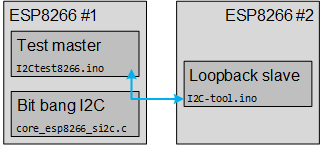This github project contains two Arduino sketches aiming at testing I2C communication.
The first sketch I2C-tool is the key one. It is an ESP8266 firmware implementing an I2C slave with spy, loop-back and configurable clock stretch injector.
The second sketch I2Ctest8266 is a test sketch. It tests the I2C master implementation (a bit bang driver) of ESP8266. It uses the I2C-tool for loopback.
The two sketches each run on an ESP8266 using the following setup.
Sketch I2Ctest8266.ino runs on ESP8266 number 1, mastering I2C transactions to ESP8266 number 2.
ESP8266 number 2 runs the I2C-tool.ino looping back messages send by ESP8266 number 1.
The goal is to test the ESP8266 I2C driver (core_esp8266_si2c.c) which comes with Arduino setup for ESP8266.
Since the ESP8266 does not have a working I2C hardware peripheral,
the I2C driver is completely written in software (a so-called "bit bang" driver).
The actual wiring is simple: connect the two ground pins GND (black), connect the two clock pins (SCL) D1 (green), and connect the two data (SDA) pins D2 (blue).
Wire both ESP8266's with USB to a PC. Load one with I2C-tool, flash it, run it, and monitor the serial output, it shows the loop-back traffic. Load the other with the I2Ctest8266, flash it, run it, and monitor the serial output, it shows the test results.
The "user manual" of the I2C-tool is the readme associated with that sketch.
The readme of the I2Ctest8266 explains what is tested and the problems found in the bit bang driver.

